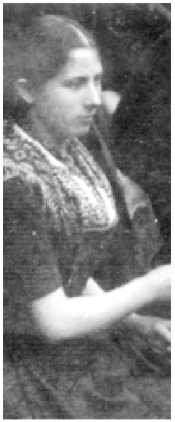Helena Patursson
Súsanna Helena Patursson (born August 27, 1864 in Kirkjubøur , Faroe Islands ; † December 15, 1916 there ) was a Faroese writer and the country's first women's rights activist .
Life
Súsanna Helena, like her well-known brothers Jóannes and Sverre, was a child of Kongsbonde (king farmer ) Poul Peder Pedersen and his wife Ellen Cathrine Djonesen. She grew up on the largest and most historic farm in the Faroe Islands in Kirkjubøur , where she received private lessons with her brothers. For further education she went to Copenhagen , where she learned to play the piano and handicraft. She worked there as a paralegal until 1904, when she returned to the Faroe Islands at the age of 40.
Like her brothers, she had been active in the national revival movement since 1888 , but directed herself towards women. In 1889 she wrote the first Faroese play Veðurføst . It deals with the political participation of women and their organization of private lessons in the Faroese language . Only fragments of this piece have survived. Súsanna Helena wrote a few poems and short stories in the leading newspapers of the Faroese nationalists, Føringatíðindi and Fuglaframi . In 1896 she was able to get the Faroese Association in Copenhagen to accept women.
After her return to the Faroe Islands, Súsanna Helena Patursson founded the first Faroese women's magazine Oyggjarnar ("The Islands"), which appeared from 1905 to 1908 under her leadership. In those years it would remain the only magazine in Faroese that appeared regularly. Its content revolved around the teaching of the written language through the mere existence of the magazine, employment opportunities and training positions for women and, last but not least, Faroese cuisine and Faroese handicrafts . The recipe collection was then published in 1909 as the cookbook Matreglur fyri hvørt hús (“Dishes for every home”). In 1912 the book Fríðka um búgvið ("Beautiful Living") followed.
Unfortunately, although the newspaper met with great interest, it did not receive the support of its politically active brothers. Her biographer Malan Marnersdóttir attributed this to the fact that the feminine and insecure voice was not heard . It was not until 1952 that Sigrið av Skarði Joensen created an organization for Faroese women with the women's association Kvinnufelagið , which refers to the feminist pioneer Súsanna Helena Patursson.
On May 19, 2008 Helena Patursson was honored with a stamp.
Web links
- Dansk Kvindebiografisk Leksikon (Danish, article by Malan Marnersdóttir )
| personal data | |
|---|---|
| SURNAME | Patursson, Helena |
| ALTERNATIVE NAMES | Patursson, Súsanna Helena (full name) |
| BRIEF DESCRIPTION | Faroese writer and women's rights activist |
| DATE OF BIRTH | August 27, 1864 |
| PLACE OF BIRTH | Kirkjubøur |
| DATE OF DEATH | December 15, 1916 |
| Place of death | Kirkjubøur |

